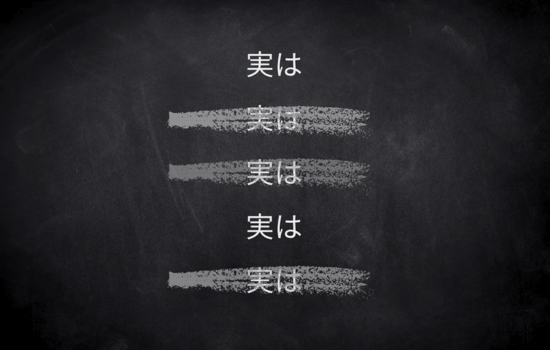There’s a significant gap between the English word “actually” and the Japanese word “実(じつ)は.” This gap is quite substantial, and it’s common to hear “実は” used incorrectly by learners of Japanese.
Understanding “実(じつ)は”
“実は” is used when the speaker expects the listener to be surprised or when the speaker feels awkward or uneasy about revealing a fact or truth. The nuance of “実は” implies that what follows might be unexpected or is something that the speaker has been hesitant to share.
Examples of Correct Usage:
- 実は会社を辞めようと思っています。
- (じつは かいしゃを やめようと おもっています。)
- Translation: “Actually, I’m thinking of quitting my job.”
- Explanation: The speaker might feel awkward or expect the listener to be surprised by this decision.
- 実は彼と付き合うことになったの。
- (じつは かれと つきあう ことに なったの。)
- Translation: “Actually, I’ve started dating him.”
- Explanation: This might be surprising news to the listener.
- 実は留学しようと思ってるんだ。
- (じつは りゅうがく しようと おもってるんだ。)
- Translation: “Actually, I’m thinking of studying abroad.”
- Explanation: The speaker might have been hesitant to share this plan, anticipating the listener’s surprise.
- 実はぎっくり腰になっちゃって、今動けないんです。
- (じつは ぎっくりごしに なっちゃって、いま うごけないんです。)
- Translation: “Actually, I threw out my back and can’t move right now.”
- Explanation: This is something unexpected that the speaker might be embarrassed to admit.
- 実は会社の経営が上手くいっていないんです。
- (じつは かいしゃの けいえいが うまくいっていないんです。)
- Translation: “Actually, the company isn’t doing well.”
- Explanation: The speaker might feel uncomfortable revealing this negative news.
- 実は私の父は俳優なんです。
- (じつは わたしの ちちは はいゆうなんです。)
- Translation: “Actually, my father is an actor.”
- Explanation: This might be surprising information that the speaker hasn’t shared before.
- 実は君に隠していたことがあるんだ。
- (じつは きみに かくしていたことが あるんだ。)
- Translation: “Actually, there’s something I’ve been hiding from you.”
- Explanation: The speaker might feel uneasy revealing this secret.
- 実は色々とあって、飛行機に乗れなかったんです。
- (じつは いろいろと あって、ひこうきに のれなかったんです。)
- Translation: “Actually, due to various reasons, I couldn’t get on the plane.”
- Explanation: The speaker might feel awkward explaining why they missed the flight.
- 実は僕には生き別れた弟がいるんだ。
- (じつは ぼくには いきわかれた おとうとが いるんだ。)
- Translation: “Actually, I have a long-lost brother.”
- Explanation: This is a surprising and possibly sensitive revelation.
Incorrect Usage Example:
先生、実は質問があります。
- (せんせい、じつは しつもんが あります。)
- Translation: “Actually, I have a question.”
- Explanation: This is not a situation where the listener would be surprised or where the speaker would feel awkward. “実は” is not necessary here. Instead, “すみません、しつもんが あります。”— “Excuse me, I have a question.”) would be more appropriate.
実は今日はディズニーランドに行きませんか?
- (じつは きょうは ディズニーランドに いきませんか?)
- Translation: “Actually, shall we go to Disneyland today?”
- Explanation: The use of “実は” here doesn’t fit the situation. Inviting someone to go somewhere doesn’t inherently carry a surprising or awkward tone. A more natural way to suggest this would be “今日はディズニーランドに行きませんか?” (“Shall we go to Disneyland today?”).
あ、すみません。実は、カプチーノお願いします。
- (あ、すみません。じつは、カプチーノおねがいします。)
- Translation: “Oh, excuse me. Actually, could I have a cappuccino, please?”
- Explanation: The phrase “実は” is unnecessary here because ordering a cappuccino is not surprising or awkward. A more natural way to correct the order might be “すみません、やっぱりカプチーノお願いします。” (“Excuse me, after all, could I have a cappuccino, please?”). “やっぱり” (after all) better conveys that the speaker changed their mind, which fits the situation without adding unnecessary complexity.
わぁ。このラーメンは実はおいしいですね。
- (わぁ。このラーメンはじつはおいしいですね。)
- Translation: “Wow, this ramen is actually delicious.”
- Explanation: Even if the speaker wasn’t expecting the ramen to be delicious, natives rarely use “実は” in this context. “実は” implies the speaker is revealing something surprising to the listener, but here, the speaker is just expressing their opinion. A more natural way to say this would be “このラーメン、おいしいですね。” (“This ramen is delicious.”) to directly share their impression.
- Alternative: “わぁ。このラーメンは思っていたよりもずっとおいしいです。”
- (わぁ。このラーメンはおもっていたよりもずっとおいしいです。)
- Translation: “Wow, this ramen is much more delicious than I thought.”
- Explanation: This alternative emphasizes the element of surprise, suggesting that the ramen exceeded the speaker’s expectations. However, “このラーメン、おいしいですね。” is generally better and more polite, as it doesn’t imply any prior doubt about the quality of the food, which could be considered rude. The simpler sentence is more neutral and positive.
Summary:
Using “実(じつ)は” correctly requires an understanding of its nuanced implications of surprise or awkwardness. Overusing it or using it in the wrong context, such as for simple or expected statements, can lead to awkwardness or misunderstanding in conversation.
